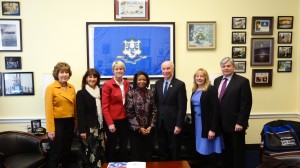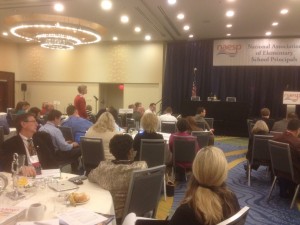CT Delegates Bring Their Voices to Capitol Hill

By Regina Birdsell, Assistant Executive Director
A delegation of Connecticut educators attended the NAESP National Leaders Conference on February 22-26, 2014. A highlight of the conference was a panel discussion featuring Deborah Delisle, assistant secretary of the U.S. Department of Education, and Chris Minnich, executive director of the Council of Chief State School Officers. The focus was on instructional leadership and national/state perspectives on policy. Key discussion points included Common Core and difficulties some states are having with the roll out; principal & teacher evaluation; and, funding under Title 1 & Title II.
 The group visited Capitol Hill and met with six of the state’s seven Congressional representatives. Discussion points included principal evaluation; early childhood education; reauthorization of ESEA; and, after-school programming. These discussions were supported with information from acting principals representing elementary schools in West Hartford, Bristol and Wallingford. Senator Murphy is on the education committee in the Senate and Congressman Courtney is on the education committee in the House. CT’s federal legislators were supportive of discussion points and expressed frustration with the inability to move legislation forward under the present climate in Congress.
The group visited Capitol Hill and met with six of the state’s seven Congressional representatives. Discussion points included principal evaluation; early childhood education; reauthorization of ESEA; and, after-school programming. These discussions were supported with information from acting principals representing elementary schools in West Hartford, Bristol and Wallingford. Senator Murphy is on the education committee in the Senate and Congressman Courtney is on the education committee in the House. CT’s federal legislators were supportive of discussion points and expressed frustration with the inability to move legislation forward under the present climate in Congress.
Here is a quick glimpse of NAESP’s positions and observations about some key federal legislation:
• ESEA is still not reauthorized. There is a House bill, not supported by any Democrats, and a Senate bill. NAESP’s position is that reauthorization recognizes the substantive role of principals and includes support for instructional leadership and provisions for districts/states to include programs for quality recruitment, preparation and professional development for principals. Additionally, reauthorization must include language that would require 10% of Title II funds be allocated for principal professional development.
• Federal role in principal evaluation should guide states and districts to develop fair and objective evaluation systems.
• The Bipartisan Budget Act (BBA) provides a level of certainty for educational funding for the upcoming fiscal years. A longer term agreement was not reached to replace the remaining eight years of sequester cuts. Other related items: prioritize formula grants over competitive grants; support an increase to Title I to low income students; and fund IDEA to the full 40%.
Legislation Currently under Consideration:
Early Childhood
H.R. 3461/S. 1697 – Strong Start for America’s Children Act
S.322 – Ready to Learn Act
Literacy
H.R. 2706/S.758 – The Learn (Literacy Education for All, Results for the Nation) Act
Principal Leadership
H.R 1736/S.840 – School Principal Recruitment & Training Act
H.R. 2172/S.1062 The Educator Preparation Reform Act
